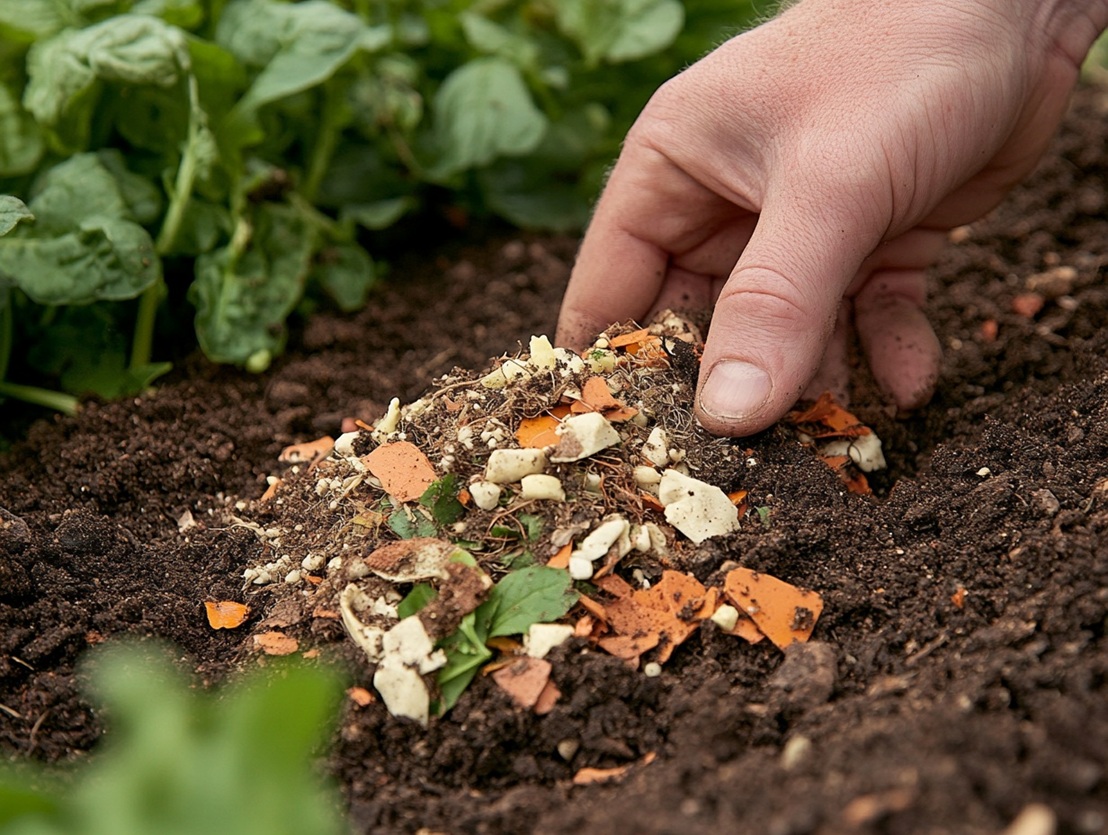A Guide to Boosting Your Garden’s Productivity
Whether you’re growing juicy tomatoes, crisp lettuces, or vibrant flowers, the quality of your soil sets the foundation for a thriving garden. The best organic soil additives can transform an ordinary plot into a nutrient-rich oasis, dramatically improving soil structure, fertility, and plant health. By understanding which organic amendments to choose and how to apply them, you’ll not only increase your garden’s productivity but also create a more sustainable and resilient environment for your plants. From time-tested classics like compost and well-rotted manure to lesser-known options like rock phosphate and worm castings, this guide will help you cultivate healthier, more abundant harvests.
Understanding Organic Soil Amendments: Nurturing Your Garden’s Core
Before diving into specific additives, it’s essential to understand the importance of organic matter in soil health. Organic soil amendments consist of naturally derived materials—often rich in nutrients and beneficial microbes—that, when added to your garden’s soil, enhance its fertility, structure, and overall quality.
Why Organic Soil Additives Matter
Plants rely on a balanced supply of nutrients, proper drainage, and adequate moisture retention to flourish. Organic amendments support these conditions by:
- Improving soil structure, allowing for better root penetration and aeration.
- Increasing water-holding capacity, ensuring consistent moisture levels.
- Enhancing nutrient availability, offering a steady supply of essential elements.
- Encouraging beneficial microbial activity, fostering a healthy soil ecosystem.
For a deeper dive into the science behind soil composition, explore our article on The Science of Soil: Understanding and Improving Soil Composition for Better Yields.
Compost: The Cornerstone of Organic Soil Amendments
When it comes to the best organic soil additives, compost often tops the list. Derived from decomposed kitchen scraps, yard waste, and other organic materials, compost is a powerhouse for improving garden soil.
Benefits of Adding Compost to Your Garden Beds
- Rich Nutrient Profile: Compost provides a balanced blend of macro- and micronutrients that feed plants throughout the growing season.
- Enhanced Soil Structure: The humus in compost encourages soil aggregation, promoting better drainage and aeration.
- Increased Moisture Retention: By improving soil structure, compost helps retain moisture, reducing water requirements.
- Boosted Microbial Life: Beneficial microorganisms thrive in compost-rich soil, breaking down nutrients into plant-available forms.
To learn how to create your own high-quality compost at home, check out Composting 101: Transforming Kitchen Waste into Garden Gold.
Well-Rotted Manure: A Time-Honored Soil Booster
For centuries, gardeners have relied on well-aged manure as one of the best organic soil additives to enrich their plots. Manure from herbivores like cows, horses, and sheep provides a wealth of nutrients, along with organic matter that improves soil structure.
How to Safely Use Manure as an Organic Amendment
- Age It Properly: Fresh manure can scorch plants due to high nitrogen levels. Allow it to age or compost for several months before applying.
- Apply in Moderation: While beneficial, manure is nutrient-dense. Spread a thin layer—about 1-2 inches—over the soil surface and mix it in lightly.
- Avoid Contamination: Use manure sourced from trusted, chemical-free farms to prevent introducing herbicide residues into your garden.
For more tips on enhancing soil fertility naturally, read our guide on DIY Homemade Fertilizer: Turning Kitchen Scraps into Nutrient-Rich Soil.
Leaf Mold: A Gentle, Nutrient-Rich Addition
Leaf mold, created by decomposing leaves, is an often-overlooked organic soil additive that can work wonders for soil health. While leaf mold contains fewer nutrients than compost, it excels at improving soil structure and moisture retention.
Why Leaf Mold Deserves a Spot in Your Garden
- Improved Soil Texture: Leaf mold creates a crumbly, well-aerated environment that encourages robust root development.
- Moisture Management: Its sponge-like consistency helps retain water, reducing irrigation needs.
- Sustainable and Easy to Produce: Simply gather fallen leaves, pile them up, and let nature do the rest.
Worm Castings: The Ultimate Organic Soil Conditioner
Worm castings, often referred to as “black gold,” are a gardener’s secret weapon. Produced by earthworms as they digest organic matter, these nutrient-dense pellets are teeming with beneficial bacteria and essential nutrients.
Key Advantages of Using Worm Castings
- Superior Nutrient Availability: Plants easily absorb the nutrients in worm castings, leading to improved growth and yield.
- Enhanced Soil Structure: Castings help bind soil particles into aggregates, increasing aeration and drainage.
- Disease Suppression: The beneficial microbes in worm castings can help ward off soil-borne pathogens.
For guidance on improving soil health and nutrient balance, see our article on The Essential Guide to Crop Rotation: Boosting Soil Health and Yield.
Bone Meal and Blood Meal: Powerful Organic Fertilizers
Bone meal and blood meal, derived from animal byproducts, are potent organic soil additives that supply essential nutrients—particularly phosphorus and nitrogen—to support healthy plant growth.
Selecting and Using Bone Meal and Blood Meal
- Bone Meal: High in phosphorus, ideal for promoting root development and flower production.
- Blood Meal: Rich in nitrogen, making it suitable for encouraging leafy growth in vegetables and ornamentals.
- Application Rates: Follow package instructions to avoid over-fertilizing. A little goes a long way, especially with these concentrated amendments.
Rock Phosphate and Greensand: Slow-Release Mineral Sources
If you’re looking to gradually enrich your soil with minerals and trace elements, rock phosphate and greensand can be excellent additions. These slow-release amendments provide nutrients over time, improving soil chemistry and plant health in the long run.
Incorporating Mineral Amendments into Your Garden
- Rock Phosphate: Supplies phosphorus slowly, benefiting root crops and flowering plants.
- Greensand: Rich in potassium and trace minerals, enhancing overall soil fertility.
- Use Sparingly: A small amount mixed into the soil every few years can yield lasting benefits.
For more insights on soil management and natural amendments, consider visiting reputable external sources like the U.S. Department of Agriculture or Penn State Extension for research-based guidance.
Biochar: Enhancing Soil Structure and Carbon Sequestration
Biochar, a charcoal-like substance produced by burning organic material in a low-oxygen environment, has gained popularity as a sustainable soil amendment. Its porous structure traps nutrients and water, improving soil fertility and contributing to long-term carbon storage.
Benefits of Using Biochar in Your Garden
- Increased Soil Aeration: Biochar’s porous surface creates space for roots, water, and beneficial microbes.
- Nutrient Retention: It holds onto nutrients, preventing leaching and ensuring a more stable nutrient supply.
- Long-Term Soil Health: Unlike other amendments that break down over time, biochar remains stable in the soil, offering lasting improvements.
Cover Crops and Green Manures: Building Soil Health In-Place
While not a soil additive in the traditional sense, cover crops and green manures contribute organic matter directly to your garden beds. By planting species like clover, rye, or vetch and later incorporating them into the soil, you supply nutrients, improve soil structure, and reduce weed pressure.
Reaping the Rewards of Cover Crops
- Natural Nutrient Boost: Leguminous cover crops fix atmospheric nitrogen, reducing the need for synthetic fertilizers.
- Soil Erosion Control: Roots help hold soil in place, preventing nutrient loss.
- Weed Suppression: Dense cover crop stands crowd out weeds, minimizing competition.
For step-by-step guidance on crop rotation and soil improvement, reference The Essential Guide to Crop Rotation: Boosting Soil Health and Yield.
Using Mulches to Enhance Organic Soil Additives
Mulching with organic materials—such as straw, shredded leaves, or wood chips—complements other organic soil amendments. By protecting the soil’s surface, mulch helps retain moisture, suppress weeds, and gradually break down into valuable organic matter.
Strategies for Effective Mulching
- Apply a Layer of 2-3 Inches: This depth provides sufficient coverage without suffocating the soil.
- Replenish as Needed: Organic mulches decompose over time, so top up periodically to maintain benefits.
- Combine with Other Amendments: Add compost, worm castings, or bone meal beneath the mulch layer to feed plants from the ground up.
Choosing the Best Organic Soil Additives for Your Garden
Selecting the right organic amendments depends on several factors, including soil type, crop preferences, and local conditions. Start by conducting a soil test to identify nutrient deficiencies or pH imbalances. Armed with this information, you can tailor your approach for optimal results.
Tailoring Amendments to Your Soil’s Needs
- Sandy Soils: Focus on amendments that increase moisture retention, like compost and leaf mold.
- Clay Soils: Incorporate organic matter to improve drainage and prevent compaction.
- Nutrient-Poor Soils: Add well-rotted manure, worm castings, or blood meal for a nutrient boost.
- Acidic or Alkaline Soils: Adjust pH with lime or elemental sulfur before adding amendments to optimize nutrient availability.
Applying Organic Soil Amendments for Maximum Impact
Knowing how and when to apply your chosen amendments is crucial to getting the most from them. Incorporate organic matter into the top 6-8 inches of soil during bed preparation or top-dress established plants mid-season. Consider your crops’ growth stages and nutrient demands—leafy greens, for example, benefit from nitrogen-rich amendments early on, while flowering crops may need extra phosphorus as buds form.
Application Tips and Techniques
- Mix Evenly: Distribute amendments uniformly for balanced nutrient uptake.
- Avoid Over-Fertilization: Too many nutrients can harm plants, so follow recommended application rates.
- Practice Patience: Organic amendments release nutrients slowly, ensuring a steady, long-term supply.
Monitoring Results and Adjusting Your Approach
Organic soil management is an ongoing process. Observe your garden closely: Are leaves lush and green? Are fruits forming abundantly? If growth seems sluggish, consider adding more compost or worm castings next season. Regular soil testing, record-keeping, and experimentation will help you refine your approach over time.
Continuous Improvement Through Observation
- Keep a Garden Journal: Note which amendments you used, when you applied them, and how plants responded.
- Test Soil Periodically: Check pH and nutrient levels to identify emerging imbalances.
- Adjust as Needed: Fine-tune your mixture of amendments based on your observations and test results.
Embracing Sustainability and Environmental Stewardship
By relying on the best organic soil additives, you’re not only improving your garden’s productivity but also contributing to a more sustainable world. Organic amendments reduce reliance on synthetic fertilizers, minimize nutrient runoff, and support biodiversity in the soil. By continually nurturing your soil’s health, you invest in the long-term vitality of your garden and the ecosystem it supports.
Long-Term Benefits of Organic Soil Management
- Soil Resilience: Healthy, organic-rich soils withstand drought, erosion, and nutrient depletion more effectively.
- Less Environmental Impact: Reduced synthetic inputs lead to fewer environmental contaminants and healthier surrounding habitats.
- Greater Food Security: Productive, sustainable gardens contribute to local food sources and community resilience.
After exploring the various options—from compost and well-rotted manure to worm castings and mineral amendments—it becomes clear that using the best organic soil additives will transform your garden’s health and productivity. Each amendment brings unique benefits, but all work together to create fertile, balanced soil teeming with life. As you integrate these organic solutions into your gardening routine, you’ll notice stronger plants, more abundant harvests, and a thriving ecosystem beneath your feet. Ultimately, investing in soil health ensures a brighter, more sustainable future for your garden.
Learn more about this topic with The Year-Round Vegetable Garden for Beginners.


Leave a Reply